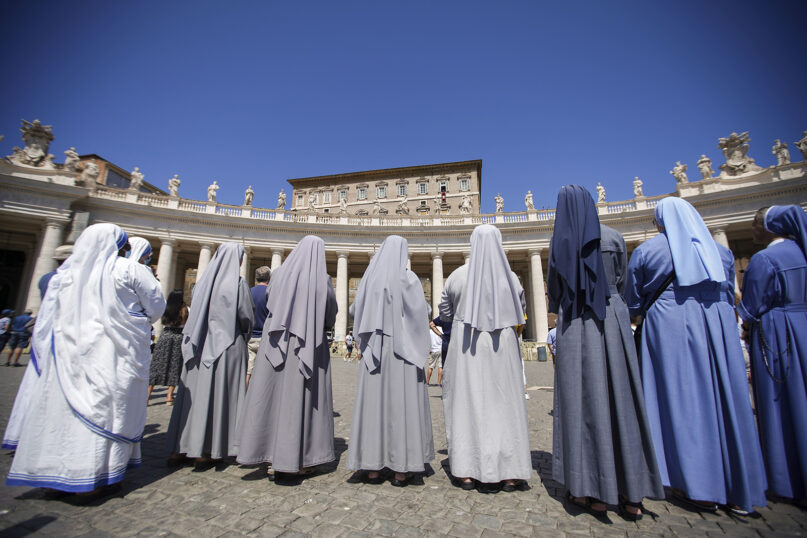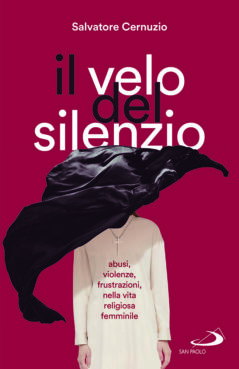New book shines light on abuse and racist discrimination of Catholic nuns
'The Veil of Silence,' a new book by Vatican reporter Salvatore Cernuzio, details the racism, abuse and discrimination faced by nuns in female Catholic congregations.

Nuns follow Pope Francis as he recites the Angelus noon prayer from the window of his studio overlooking St.Peter's Square, at the Vatican, Sunday, Aug. 16, 2020. (AP Photo/Andrew Medichini)
November 29, 2021
By
Claire Giangravé
VATICAN CITY (RNS) — In a newly published book, a Vatican journalist details the mental and physical abuse, oppression and racism experienced by religious sisters. Their treatment is often considered one of the most hidden issues within the Catholic Church.
The book, “The Veil of Silence: Abuses, Violence and Frustrations in Female Religious Life,” is written by Salvatore Cernuzio, a Vatican reporter from Italy, after he began to hear the stories of abuse and belittlement that exist in many female religious congregations.
Cernuzio tells the story of 11 nuns from different backgrounds and from countries all over the world who experienced forms of abuse — verbal, physical and sexual — while in a religious congregation. The stories differ in terms of who perpetrated the abuse, the reactions of the victims and the cultural context. But the stories share a common approach from the hierarchy, the book argues.
“They chose to ‘protect’ the good name of the institution by sacrificing the victim,” Cernuzio writes in the introduction to his book. “The abused nun is transferred, accused of seducing the priest, and the priest stays at his place, continuing his predatory activity undisturbed.”

The Italian cover of “The Veil of Silence: Abuses, Violence and Frustrations in Female Religious Life” by Salvatore Cernuzio. Courtesy image
When the abuse comes from a woman, the alleged victims are laughed off, Cernuzio wrote. Most of the stories in the book do not involve sexual abuse but, rather, cases of psychological abuse and abuse of power that have left a deep mark in the lives of the nuns. The fact that instances of abuse in female congregations vary widely makes them “even more difficult to recognize and address,” Cernuzio writes.
The issue of racism emerges several times in the book, often experienced by women from Africa, India and the Philippines who are more vulnerable because they lack social support. “Many claim to have been evaluated based on the color of their skin or their country of origin, regardless of their qualities and formation,” Cernuzio wrote.
A Black nun in the book, referred to as Anne-Marie, spent every morning clearing snow during the winter in Minnesota while the other nuns watched from inside. She also felt like she was never listened to during the community meetings, “especially because I was foreign, and worse still, African.”
Every nun who spoke to Cernuzio asked to remain anonymous, a clear sign of the “climate of fear” that Cernuzio believes to be the “most dangerous and challenging obstacle to possible reform efforts.”
Many of the nuns saw their congregations and even the Vatican turn their back on them once they decided to leave their communities and were left alone to address the mental health issues they developed as a result of their experiences.
“They forgot that behind the habit there were people,” said the nun, Marcela, in the book, adding that many in her congregation suffered from stress and burnout. Another nun said she was forced by her superiors to leave the congregation after being diagnosed with depression.
In 2019, on his flight back from an apostolic visit to the Middle East, Pope Francis acknowledged the reality of abuse experienced by many religious sisters, which he described as an “ongoing problem” and a “scandal.” He told reporters that some clergymen had already been suspended as a result and that the church was “working on it.”
That same year, Pope Francis issued a decree known as a motu proprio, called “Vos Estis Lux Mundi,” meaning “You are the light of the world.” The document introduced new procedures to combat sexual abuse, making it mandatory for priests and nuns to report cases of abuse to the competent authorities.

Salvatore Cernuzio. Courtesy photo
A nun in the book, going by the name Elizabeth, said she was stopped from reporting the abuse of a fellow nun by her superior general, despite Pope Francis’ decree. In the book, she talked to Cernuzio about religious sisters being “kept in captivity.”
Another nun, Sister Aleksandra, claimed she was sexually abused by a priest with whom she collaborated for a project to support young women wishing to become nuns. When she reported the fact to her superior general, she was told there had been previous reports and that “obviously, if it happened, it’s because us nuns provoked the priests.”
Nearly 4% of religious congregations have been put under investigation by the Vatican due to abuse allegations, according to data from the Vatican Congregation for Institutes of Consecrated Life, but Cernuzio believes this is “just the tip of the iceberg.”
Numerous cases of abuse of nuns have been reported all over the world, and in India a bishop was arrested in 2018 for having allegedly abused a nun 13 times over the span of two years. In July 2020, the Jesuit-run magazine “Civiltà Cattolica” published a report on the cases of sexual abuse of nuns. A 2018 investigative report by the Associated Press found that the abuse of nuns “is global and pervasive, thanks to the universal tradition of sisters’ second-class status in the Catholic Church and their ingrained subservience to the men who run it.”
RELATED: Pope Francis and Macron meet at the Vatican amid clergy abuse scandals in France
Religious orders are at their worst “when they are interpreted and enacted in such a way to infantilize, oppress or even manipulate and destroy people,” wrote Sr. Nathalie Becquart, the undersecretary of the General Secretariat for the Synod of Bishops, in the preface to the book.
According to Becquart, the abuse of nuns in the Catholic Church must be addressed in the wider context of synodality, referring to Pope Francis’ effort to reform the power structures within the institution through “listening and the participation of everyone and taking joined responsibility.”
Lucetta Scaraffia, the former editor of “Women, Church, World,” a monthly magazine published alongside the Vatican newspaper L’Osservatore Romano, resigned in 2019, claiming that the Vatican had tried to stop her from publishing stories on the abuse of nuns.
In an interview with Religion News Service, Scaraffia said the abuse of nuns in the church is a “much more complex” issue, because in some cases priests who committed the abuse are also responsible for procuring abortions if the nun is pregnant. The Catholic Church is vocally opposed to abortion and considers it a sin, meaning such cases create “a crisis of credibility of the church that goes beyond sexual weakness.”
“Since there are loads of reports by religious sisters at the Vatican, they don’t want to consider them as believable voices,” Scaraffia said. “If you don’t think the reports of abuse are believable it implies that you don’t think that anything coming from women is believable, for me these two things are connected.”
“The Veil of Silence” is currently only available in Italian.
